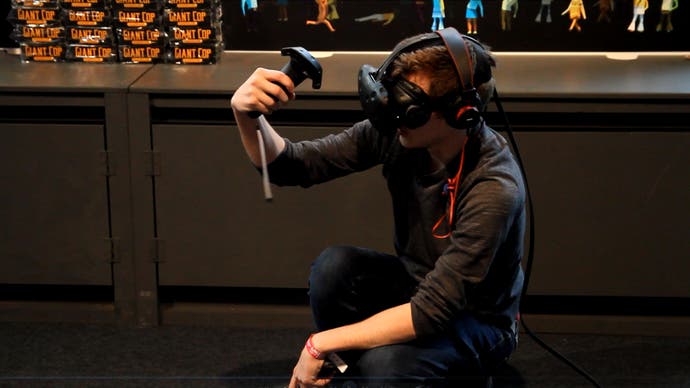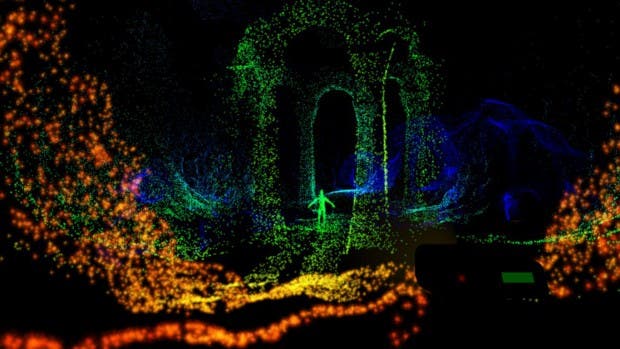Seven games you should check out at EGX Rezzed
VR! Yoga balls! Solitaire!
Happy final EGX Rezzed day! It's been a good time so far, the warrens of the Tobacco Dock playing host to so many fascinating games. We've come up with a quickfire list of our own highlights, games we've discovered or become reacquainted with old favourites (hello Gang Beasts, once again), and if you're looking for somewhere to head first thing this morning you might want to check some of these out. Our best advice, though? Go somewhere you haven't been before and discover something entirely new for yourself. It's a big part of what makes this show feel special.
Shadowhand
At first glance you might think, 'oh great, another card battler'; but that's not exactly what's going on here. Shadowhand is actually a solitaire game, an evolution of (and stealth prequel to) my guilty pleasure of last year, the Jane Austen-themed casual game Regency Solitaire. Its maker, a history buff from Dorset called Jake Birkett, has spent years toiling in obscurity on venerable PC gaming portals like Big Fish, having never fancied making the jump to mobile with the rest of the casual gaming industry. Now, he's decided to head for Steam instead, blending his trademark soothing card-clearing gameplay with a versus mechanic, collectable skill cards, loot, and an 18th-century tale about the lawless adventures of a highwaywoman. Puzzle Quest is probably a more apt comparison than Hearthstone, but in any case Shadowhand is a real original, with an alluring and distinctive theme. Plus you get to tidy cards away. Likely to be one of my top timesinks of 2016. (OW)
The World is Flat

Sometimes, all it takes is the tiniest shift to see everything anew. I'm currently preparing my house for the arrival of a newborn, and it's slowly filling up with strange new items; cots, slings, a push chair and my favourite of them all, a big purple balance ball that my pregnant partner now sits on precariously when she watches University Challenge in the living room. They're all objects that fill me with gentle anxiety about what's to come.
What a lovely surprise to see one of those same balance balls reappropriated in The World is Flat, an inventive highlight of Rezzed's Leftfield section. Its designer Aubrey Hesselgren created it, by his own admission, in order to bring a little extra attention to his forthcoming geo-action game: with a wooden frame, a handful of ball bearings and a fully inflated balance ball, players are given a joyously over-sized track ball with which to navigate a distorted globe, hunting down locations in a quick-fire bout of score attack. Even without the balance ball there's a tactile, punchy delight to The World is Flat, but with it it becomes something else: an insane, brilliant mechanical arcade game that would make Tim Hunkin proud. It's likely Rezzed will be one of few chances you'll get to play The World is Flat this way. I strongly you suggest you do so. (MR)
The Turing Test
The Turing Test is a low-fi Portal meets 2001: A Space Odyssey. It's a spiritual successor and close relation to Pneuma: Breath of Life, developer Bulkhead Interactive's previous effort which mixed first-person puzzling with an obtuse theological narrative. Pneuma's puzzles impressed me, and The Turing Test's gameplay is very much along the same lines. Peuma's monologuing voice-over never clicked, however, but The Turing Test has mixed a proper sci-fi story into the platforming formula, which ironically breathes far more life into this follow-up.
Turing Test's visuals are Kubrick crossed with Aperture Science, rendered in Unreal Engine 4 with an unashamed love for chromatic aberration. Its story is another rumination on humanity, although now told through conversational dialogue without a penchant for breaking the fourth wall.
I'm rubbish at puzzle games, so after whizzing through the game's opening and feeling pretty pleased about it, Eurogamer's Ian Higton - standing behind me - was quickly telling me where to place my electric current boxes and power orbs. Puzzles centre on the remote or close-up powering of devices to activate doors, lifts and unlock new areas of your sci-fi surroundings.
The game opens with you stumbling inside an abandoned facility on Europa, the icy Jovian moon which is suitably remote, inhospitable and mysterious. The story - or the parts of it glimpsed so far - is an exploration of what it means to be human in completely alien circumstances, surrounded by technology which blurs the lines of natural and artificial intelligence. And if that all sounds a bit of puzzle too, then it's a puzzle I'm looking forward to (trying to) solving. (TP)
Giant Cop

Giant Cop tells a very familiar story. Taking on the role of a rookie cop, fresh out of the academy, you're eager to lock up the bad guys and make your city safe once again. It's a classic.
Perhaps the largest difference, I guess, comes with the fact that you're also a giant. You stomp around this tiny city, picking up its tiny criminals, before throwing them (actually throwing them) into a tiny jail. It's a wonderful concept, despite the gnawing feeling that what you're doing might be a little, y'know, oppressive.
I actually played this game at last year's EGX, back when you moved around using a controller and peered down at the city streets through a television screen. That's no longer how you play Giant Cop. Now you play it using the HTC Vive (support is planned for the other VR headsets too). And it's so much better.
Being able to stomp around in a virtual space and needing to physically crouch down to get a look at the people scarpering around below you, makes the whole thing just click. The Vive doesn't just make playing Giant Cop more fun, it forces you to fully embrace what it is to be the Giant Cop. I love it. I really do. Although it's worth knowing that you're going to look pretty daft in the process, as you'll see in a video coming next week. (CB)
Reigns
Reigns is a lovely thing and right now I'm seriously thinking about going back to the Leftfield collection and having another go. Essentially a series of cards pop up, each introducing a new challenge or event to your kingdom. You swipe left or right to determine how you want to act, with each decision affecting your country's stats. It's simple enough, but balancing your treasury, popularity, martial strength and the power of the church is a remarkably difficult thing to do when you can only make binary choices.
Given how much swiping is involved, a lot of people have been talking about Reigns effectively being Tinder: The RPG, but I don't really think that's accurate. I've never used Tinder myself, but I'm still relatively confident that people don't spend their time worrying about how many people are going to die if they swipe left. Nobody's ever looked at Mark from Berkhampstead and thought 'if I swipe right, am I still going to have enough military strength to rebuff an invasion from overseas?' Basically, unless they happen to be an actual king or queen, I'm pretty sure nobody's ever used Tinder and found themselves thinking what an anxious, uncomfortable and utterly compelling experience it is to rule a country. Reigns does that from the outset, and it's very good. (JC)
Scanner Sombre

Introversion Software, the wonderfully talented independent developer behind classics such as Darwinia and Defcon, has never really been away, but after the success of Prison Architect it's delightful to see it back in such rude health. There was a time, when things were a little more precarious, when we wondered whether we'd ever see another Introversion game again. Now, on the show floor at Rezzed, we've got two whole new ones to devour.
Well, they're not quite fully cooked. Introversion's using its booth as a test bed for two of its internal prototypes: Wrong Wire, a pleasantly tactile puzzler about the tricky business of bomb disposal, but it's Scanner Sombre that caught my attention. It's a simple concept, perhaps familiar from Giant Sparrow's Unfinished Swan: you're exploring a cave shrouded in darkness, piercing through the black with dots of light from the locator device in your hands. There's not the satisfying splash of Unfinished Swan's ink, but there's something just as playful as you alter the aperture of your torch and paint the scenery. And what utter style - a brilliantly abstract pointillist dream where the caves you've explored stretch out in a dancing ribbon of light. It's still a concept for now, but I'm convinced: here's hoping Introversion takes this one forward. (MR)
The Playroom VR
A chance to try anything at all on PlayStation VR is obviously a big draw at Rezzed, but I particularly love this follow-up to the original Playroom - an augmented-reality demo for the PS4's camera peripheral - for breaking all the rules of virtual reality before they've even been established. It's a genuinely hilarious party game which pits one player in virtual reality against (or alongside) friends playing on the TV back in the 'real' world. The asymmetric multiplayer larks are strongly reminiscent of Wii U launch title Nintendo Land in the way they exploit the possibilities of one player having a different perspective on the action to everyone else's - with the added joy of performance, as the VR player's head movements and voice are captured to animate their character on the TV screen. This is VR that's paradoxically about having fun with other people, rather than retreating into your own private experience, and it's joyful stuff - as well as a brilliant vindication of Sony's insistence on a 'social screen' as an integral part of any VR set-up. (You can read more about it in my write-up of PlayStation VR's GDC showing.) (OW)
Written by Johnny Chiodini, Tom Phillips, Oli Welsh, Chris Bratt and Martin Robinson








